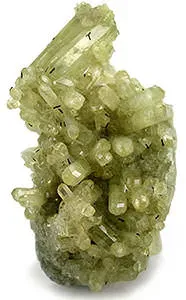 Vesuvianite was first discovered as small, perfect crystals, on the Italian volcano Vesiuvius in southern Italy. After its initial discovery, the mineral was found worldwide. Vesuvianite is also called "idocrase,"" which derives from the Greek words idea, meaning ""likeness,"" and krasis, meaning ""mixture."" This name comes from the fact that vesuvianite crystals show a mixture of other mineral forms."
Vesuvianite was first discovered as small, perfect crystals, on the Italian volcano Vesiuvius in southern Italy. After its initial discovery, the mineral was found worldwide. Vesuvianite is also called "idocrase,"" which derives from the Greek words idea, meaning ""likeness,"" and krasis, meaning ""mixture."" This name comes from the fact that vesuvianite crystals show a mixture of other mineral forms."
 There are several different varieties of vesuvianite. One of the most popular varieties is californite, a lumpy green variety that resembles
There are several different varieties of vesuvianite. One of the most popular varieties is californite, a lumpy green variety that resembles ![]() jade. This is also sometimes called "vesuvian jade,"" and is usually carved into figurines or cut as cabochons. Cyprine is another rare variety, which comes from Norway and is a beautiful blue color. Xanthiteis is a yellowish green variety found in New York, and wiluite is a green crystal found in the former USSR."
jade. This is also sometimes called "vesuvian jade,"" and is usually carved into figurines or cut as cabochons. Cyprine is another rare variety, which comes from Norway and is a beautiful blue color. Xanthiteis is a yellowish green variety found in New York, and wiluite is a green crystal found in the former USSR."
 Vesuvianite can be confused with demantoid
Vesuvianite can be confused with demantoid ![]() garnet, diopside, epidote, smoky
garnet, diopside, epidote, smoky ![]() quartz, zircon,
quartz, zircon, ![]() peridot, axinite, and different varieties of tourmaline. Vesuvianite is rarely used for jewelry, but is often cut for collectors as step, brilliant or mixed cuts. Vesuvianite is usually colorless, but can also be red, purple, green, brown, or yellow. Jewelry lovers and collectors prize colored specimen. Vesuvianite rates a 6.5 on the hardness scale. It is brittle, and has a vitreous to resinous or adamantine luster. Stones are sub transparent to translucent with the more transparent stones being suitable for jewelry. These are normally cut into table or step cuts. Vesuvianite crystals are usually short, thick prisms with a square cross section, enhanced by cutting along their length. Large crystals are rare and thus, very expensive.
peridot, axinite, and different varieties of tourmaline. Vesuvianite is rarely used for jewelry, but is often cut for collectors as step, brilliant or mixed cuts. Vesuvianite is usually colorless, but can also be red, purple, green, brown, or yellow. Jewelry lovers and collectors prize colored specimen. Vesuvianite rates a 6.5 on the hardness scale. It is brittle, and has a vitreous to resinous or adamantine luster. Stones are sub transparent to translucent with the more transparent stones being suitable for jewelry. These are normally cut into table or step cuts. Vesuvianite crystals are usually short, thick prisms with a square cross section, enhanced by cutting along their length. Large crystals are rare and thus, very expensive.
 Vesuvianite occurs in impure limestones that have undergone contact metamorphism, such as blocks of dolomitic limestone that erupted from Vesuvius. Vesuvianite occurs in various locations around Austria, Canada, Italy, Switzerland, Romania, and the United States. It is found in association with grossular
Vesuvianite occurs in impure limestones that have undergone contact metamorphism, such as blocks of dolomitic limestone that erupted from Vesuvius. Vesuvianite occurs in various locations around Austria, Canada, Italy, Switzerland, Romania, and the United States. It is found in association with grossular ![]() garnet, wollastonite, diopside, and calcite.
garnet, wollastonite, diopside, and calcite.
 Vesuvianite is said to be a stone of humor. It is recommended for those who suffer from depression, or perhaps a temporary feeling of melancholy. The stone has the power to bring lightness to any situation that may seem endlessly dark.
Vesuvianite is said to be a stone of humor. It is recommended for those who suffer from depression, or perhaps a temporary feeling of melancholy. The stone has the power to bring lightness to any situation that may seem endlessly dark.